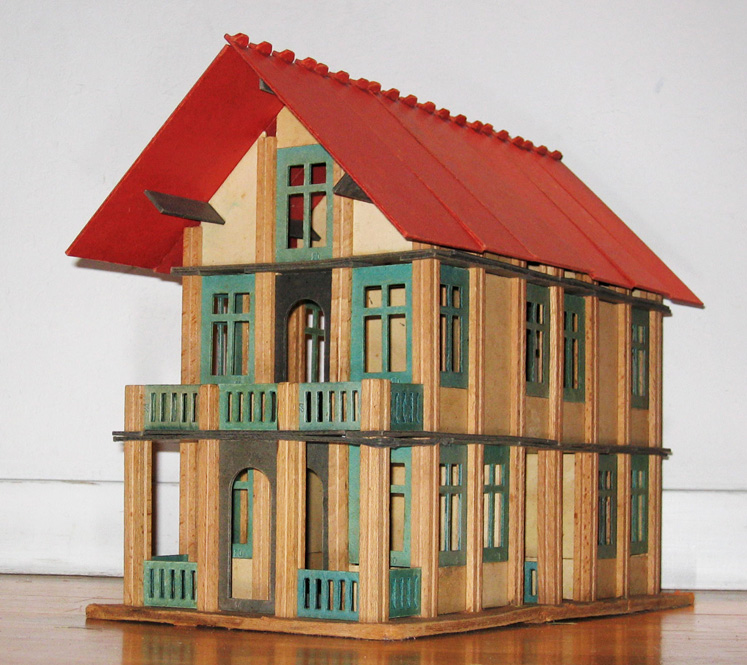
| INTRO | PARTS |
SETS Moubal Jumbo |
MANUALS Moubal Jumbo |
MARKETING |
PRICE LISTS |
BUILDING |
MOUBAL RELATED |
 |
||||||||
|
 |
Welcome to the virtual Mobaco museum, the world's most comprehensive site about the history of this vintage wood and cardboard Dutch construction toy, with information about Mobaco sets, parts, manuals, marketing and a whole lot more! For discussions, visit Mobaco on Facebook. MOBACO - INTRO Years ago, when grandpa came to visit us, he brought a Mobaco construction set he played with in the 1930's. My kids loved it. Unlike Meccano or even Lego, large models go together quickly. And they're just the right size for Playmobil figures! HISTORY Mobaco was manufactured by the Dutch company N.V. Plaatmetaalindustrie van Mouwerik & Bal between 1924 and 1961, in Zeist, The Netherlands. Moubal, as the company was commonly known, was a manufacturer of sheet metal products. Story has it that a few times a year they would clean their heavy, oily machines and stamp Mobaco parts. Starting in 1949, Jumbo, a toy and puzzle company, took over sales and marketing. They redesigned the sets and manuals, added a few parts and turned it into more of a mass market product. The parts were still made by Moubal. With the advent of Lego, interest waned. In 1962, Mobaco was discontinued, and in 1981 Moubal closed doors. Unfortunately, their archives were destroyed. Which makes it difficult to put together an accurate history... THE SYSTEM The Mobaco system consists of square wooden posts of various lengths that fit into evenly spaced holes in a thick fiberboard base board. The posts have slots on all four sides, into which slide dense cardboard panels. The panels have different colors, and are either solid or have window or door cut-outs of various shapes. Structural rigidity comes from horizontal cardboard strips and floor plates that slide over the posts and rest on the wall panels. To make rigid corners and to make long walls stiff, two layers of these strips are installed, overlapping at seams and corners. The system allows for pitched roofs. There are special gable ends and purlins that form the structural support for the roof. Opposite roof panels interlock at the ridge with hooks, and hang from the ridge beam. There are many roof panel shapes, allowing for complex roof designs. With a limited number of parts, elaborate models can be made. Models are pleasing to the eye and have a distinct 19th century look. They are really easy to put together. USED MOBACO Mobaco is regularly found on the Dutch second hand website marktplaats.nl. Occasionally it can be found on eBay.com, or at local auction sites in countries where Mobaco was sold or where Dutch people emigrated to in the 1950's (Canada, Australia, New Zealand). For a while in the early 2000's, MiniPLEX, a small Dutch company, produced an all-wood version of Mobaco using a custom router table. THIS WEBSITE Back in 2005, when I searched the internet for information about Mobaco, there wasn't much. That's why I decided to dedicate a site to this lovely system. As a result, I came in contact with several Mobaco collectors, who were most graceful in sharing their knowledge and material. I'd like to extend special thanks to Leen Kalden (indefatigable researcher and source of much of the material here), Nick Cranendonk (who gracefully gave me access to his collection), Ida Gerrits, Peter Adams, Alex Geelhoed, Henri de Graaf, Mr. Halbertsma and Koos Welling (Set Z project, LeoCAD library), all in The Netherlands, as well as several other contributors, for their generous help! With the support of this group of enthusiasts, I try to recreate the history of Mobaco, specifically the chronology of the sets and all printed material. Careful observation of minute details as well as old newspaper ads, articles, photographs, etc., help us to slowly piece together this challenging puzzle! Since 2021, this site is periodically downloaded by the Royal Library as part of their ongoing project to save (digital) Dutch heritage for future generations. It is, however, not yet accessible through the library. If you have any information that might be useful to add to this site, or corrections that should be made, please contact me at c***mol###freesbee***fr (anti-spam: replace *** with a period and ### with @). Note: Trademarks are the ownership of their respective companies. If you feel any material on this website infringes on your rights, please contact me for removal/correction. This website is a labor of love and is not monetized in any way. WEBSITE UPDATES Site originally created in 2005. Expanded and rebuilt in Seamonkey, December 2014, March - May 2016 Revised December 2017, March 2018, December 2020, May-July 2021, April 2022, November 2023, February 2024, March 2024, May-June 2024, Sep 2024 |